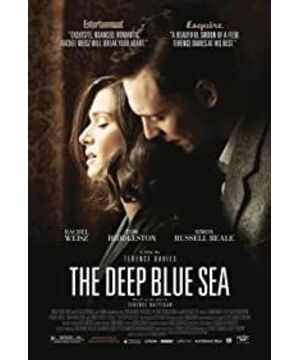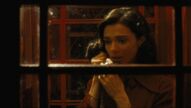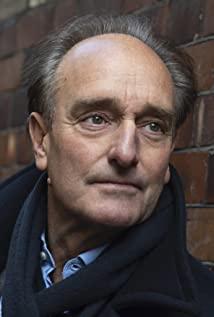The story begins with the heroine's attempted suicide and ends in the heroine's re-face to life. It happened on the same day, in the same house, in the same window. Director Terence used his iconic symmetrical lens to write us what he has always been. Best subject: the laws of daily life, trivia, dogmatism, religious beliefs, the impact of moral principles on our primitive emotions.
In this film, the film focuses more on the dilution of love by time, and the destruction of impulse and passion by stable life. When the fickle, indulgent male protagonist intoxicated by the passions and fears of World War II uses up the last drop of Serotonin in his blood (serotonin, a chemical produced in love that causes short-lived madness), he leaves it to his daughter. The protagonist's only cruel childish and ruthless farewell. In my opinion, the heroine's suicide is the best excuse to get him out of a mediocre life. Like most women, all the heroine can do after the desperation of a suicide attempt is to endure a dignified submission. Surrender to reality, surrender to reason. As Sanmao wrote in "Love": "Some people's love is just an "emotion at that time". If the other party mistakenly regards this emotion as a long-term love, it is naive. Don't worry about your forgetfulness. Forgetfulness is better than remembering everything, and it comes calmly. On the road of love, calm people are most filled with pits and valleys. One moment of true love cannot be said to be false. Love is eternal, and it cannot be said that only that moment. "Love, if not It is not easy to implement in the real life of dressing, eating, counting money, and sleeping. Sometimes we mistake it for a habit of life -- a kind of love for a man or a woman. "
The director uses a Monet-like light and shadow lens to place the profile of the heroine between light and dark, like her struggle between reason and passion. The story is intertwined in reality and memory, and the plot gradually enters ten minutes before the end of the film. climax. When the day dawned, the heroine was awakened by the hero's departure. She quickly put on her pajamas and walked gently into the living room. Seeing the neatly dressed hero packing up her luggage, she tried her best to suppress her sadness and stood there quietly. Asked him if he had breakfast, she insisted on polishing his shoes for him, quietly watching him wearing shoes, she asked him where he was in a soft voice, he answered her briefly with his head buried in his shoes, and then smiled to let her not worry The rent question, he asked her what her plans were, and encouraged her to start over as if nothing had happened. She reluctantly watched him put the last piece of clothes into the suitcase, closed the suitcase, and finally walked to the door and took off the windbreaker, he said. Goodbye, Hes, then said he would miss her, thanked her for everything, his eyes filled with tears, and at last he said, "Be Save" After a long silence, she struggled to lift her head and calmly responded: "Be Good" watched his back and closed the door without looking back. Then she found the gloves he had left on the sofa, she grabbed them, sniffed the smell of them, she began to sob, she walked slowly to the fireplace, her body was shaking constantly, she fell to her knees, weeping, In Samuel Barber's 1939 violin concerto, the film reaches its climax, and the flame of love is so mercilessly extinguished. When the violin and other instruments complement each other, the director turns the camera from the heroine's back in front of the window to the scene. The ruins in the desolate autumn day outside the window reminded me of Baudelaire's "Autumn Song":
Soon, we will sink into the cold darkness, do
n't you! The glare of our summer is too short!
I have heard the crashing of sadness, the
loud wood falling on the courtyard flagstones.
View more about The Deep Blue Sea reviews











